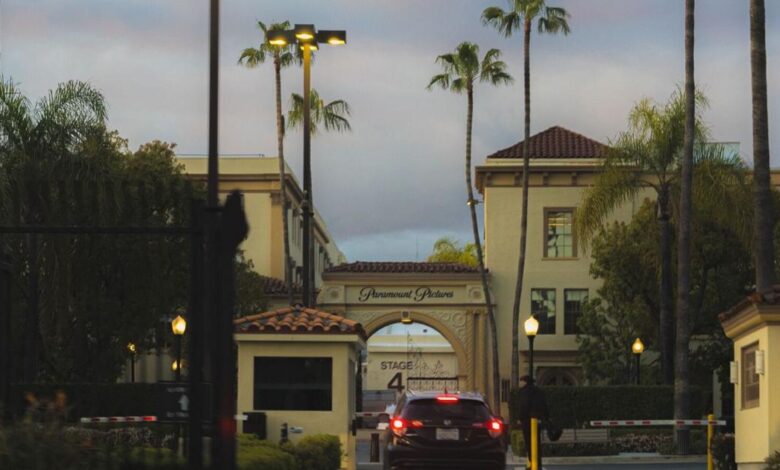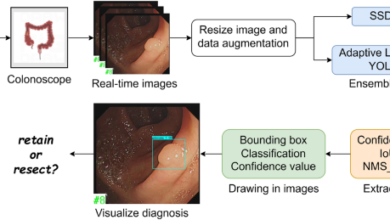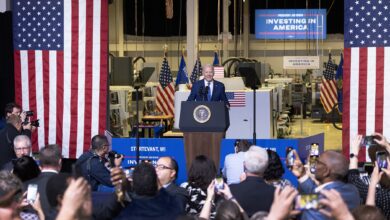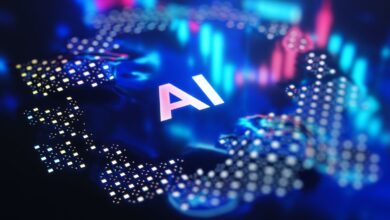On artificial intelligence: the usefulness and dangers of AI | Views

The entrance to Paramount Pictures in Hollywood.
As my mind wanders to AI, robots, and machines replacing humans, realizations enter and I see it not as AI troubles, but as humans abuse the systems we create. I see the decline and lack of efforts in schools, and how hesitant people are for social interaction and the affliction to connection.
Each day there are new advancements in AI. But if it is learning, and each day it is getting to know more things, and it’s getting smarter, then it wasn’t smart to begin with. How are we supposed to believe in something when it does not have the full capable potential of its vast atmosphere?
There are talks that it is a scary thing. Something is happening. But where is this thing? What does it look like? Does it have four eyeballs? Does it hide in the closet or underneath my bed at night? No. All it is is a technique and a machine to operate and make our lives easier for no reason. The true villain behind it is us.
The ones who use it, use it incorrectly. The people who tend to think that taking corners and skipping the lessons we have learned, and parental figures have seen and felt before us somehow doesn’t matter anymore. We strive for new advancements with no idea where they will lead, and somehow, that is a resource.
We have been doing it for over 100 years and yet companies are wanting to make a fully self-driving car. The reasons why does not enter into my atmosphere since there is no valid reason. We are capable of writing an essay, creating math solutions, driving cars, and having surgery for a knee replacement. Yet as time passes, humans find ways for humans to do less. With that, comes laziness, lack of common sense, and street smarts vanish.
By doing the things on my own and creating solutions, it gave me a sense of self-respect. The realizations that I have the potential to do the things that I want to strive for, which is excellence.
To be your own person with imagination and self-fulfilling creativity is to see happiness and sadness at their best and worse. To understand determination, anguish, grief and unadulterated bliss.
Yet some choose not to.
It’s the opposite of an opportunity to make one’s life better. Yet they vanish like a supernatural ghost you see in the distance. Or a political figure’s good nature when they start to run for office.
The speech in which they speak is loud and ruthless. Harsh, yet dull with a banal sense of sophistication. They postpone any type of meaningful discussions.
I choose, consciously, to be different. I challenge and take charge. I avoid talking when I do not know. Possibly taking away that one vestigial piece of truth the opposition speaks.
After all that, there’s still some nameless undistinguishable apprehension in their unconscious mind that I have so easily picked out. That smile. That wave. That cheers of a plastic cup of and glaring pessimistic view they have on the world.
It is something that they do without. It’s something that I have and it’s something that I have noticed.
Otherwise known as self-respect.
I do have some relevance in this topic. Last semester in my critical thinking class, nonfiction, I and three others were asked to present a topic of an ethical crisis. We chose artificial intelligence. My nine-page paper that came shortly after that was also my final paper of the semester included 10 pros and 10 cons of AI.
We broke into several categories including entertainment and education.
Education
Each time a new class for the semester begins, the class is given or told to look at the syllabus on the website and to see what is to be done and what is forbidden. Lately, more and more and then all of the classes I endure are promptly educating the students of Al and the use of cheating.
“No passing notes in class.”
“No phones in class.”
“No use of AI in class.”
The evolution of teachers’ habitual demands.
Now students can formulate ideas and have a starting point of creativity. Ask AI how to manage test anxiety. Ask for steps on how to prepare me for transferring colleges, and how to find an internship for creative writing.
Yet, students are having the ease without the idea of repercussions for the abuse of AI.
The lack of creativity it can cause may lead to students not developing properly. I assume it began with isolation and students finding it easier to not engage fully with teachers and peers. Now we are all back to normal and we assume we shall strive for connectivity.
Yet some are not capable without their AI to guide them. They are now relying on it.
Just last week I saw on TV a robot parents can buy to help their child learn social skills and communication.
The choice is not whether or not students learn the homework and know the material given to them, but now it is about whether they strive for excellence or fall behind.
Critical thinking is not just to “dive deeper” into ideas. It is to find a topic, idea, and solution to deconstruct it and keep asking questions until you or the other person breaks down into oblivion where the answers cannot justify the questions being asked, and there are no more answers to give.
Common sayings will say something along the lines of “going beneath the surface level”, or “the tip of the iceberg” or some of those bland sayings that are something entirely other. The people who use those are the ones who need the understanding of critical thinking.
But I can not describe what the surface level is. Each scenario is different. One may not have to go extremely deep into understanding the topics, ideas, and/or solutions. One can not pre-plan the surface level. One must learn to evolve while the conversation unfolds.
Over time, the one questioning, the questioner/critical thinker, evolves the ability to articulate high-level criticism. The criticism should not be negative, but to help yourself and the one you are trying to evaluate. But I do believe sometimes negative and harsh realism is imperative. Take a hammer to a rock and smash, breaking, exposing each particle until you see and can extract the gold from the inside.
That is the purpose of each moment. Questioning to an extreme, harshly or quietly, and gently pursuing and constantly spiraling into the clarity you both can subconsciously agree on. You both will know it, the critical thinking, is done because there will be a quiet sense of revelation.
If one stops the dedication to think, critique, and define, then one’s creativity is dead.
AI can not be a pillar of learning without knowing the consequences. One must maintain an understanding of how to properly use it.
In my journey to find answers, I conducted a Q&A interview with Tara Giblin, the Acting Vice President of Instruction at Orange Coast College, about her ideas and thoughts about AI in education.
Q: How do you see the use of AI in today’s education system?
A: “As an administrator, I have heard many conversations by faculty about how AI is changing or will change the way they teach. Our OCC Faculty Senate has placed high importance on discussing AI weekly because it is impacting faculty in many different ways. Right now we are just learning about its capabilities and trying to understand the pluses and minuses that come with any new technology. AI certainly has the power to make our workplace more efficient, but we are in the early stages of figuring out how it fits into the classroom.”
Q: How do you or how have you used rules or policies for student’s negative attraction to it? (Cheating)
A: “Not working directly in the classroom, I don’t have first-hand experience. However, I hear faculty talking about how they are developing policies in their classrooms to help students understand how AI fits into their learning and how to guide students away from using AI as a substitute for learning or producing original material. I have heard suggestions like having students do their writing assignments in class with spontaneous prompts, so they will do original work or as teachers, using AI to generate responses to questions in front of the class then asking the class to critique these answers and analyze how they might tell the difference between AI and original work. This raises awareness of the downfalls of AI generated answers.”
I was also intrigued to find my past Ethics professor for him to share his thoughts and ideas about AI. Professor Phillip Simpkin shares his ideas.
Q: How do you see the use in today classrooms?
A: “I see it in a large and growing way. It is being applied more and more. It is just going to increase. For good or for bad its going to be everywhere. The computer browsers were already kind of AI, to quickly find things. And that is where it is really nice. There is two uses for me. I tell my students it can help you to become a lazier, worst student or can help you become a better student. It can help you become a lazier student because it can do the work for you and then you are not going to learn. And that’s is the most troubling part for me is, on the other hand, it can help you and that is really an important part too. You can put your essay in and help you find your grammar mistakes. But the bad issue with this is when they say, find all my grammar mistakes and fix them for me. But now that’s where you don’t learn anything from the activity. At first people were wowed by it but you see how mechanical and clunky ChatGPT is. It will be over verbose and overly eloquent when you don’t really need it to be, metaphors that have no business for being in it. I am worried about that people do stuff for them that they should be doing on their own.”
Q: Do you think that teachers advise students how to use AI?
A: “I sit in a classroom and I say here is a question, what is an answer. And most of the time I get silence now. Not even a soul wants to say anything, and I may get one or two talkative students. At the same time, it’s the smartest student in the class, and they can come up with ten different answers. I hope my students listen and copy it down. And they listen to the next person and copy it down. The AI now can be that student or conversation with for a back and forth. And I think that’s a good use. So I am stuck. I send my students home all the time and I try to have them generate great ideas and I can force them to do that. A lightbulb moment may happen. But lots of students don’t feel that creative for whatever reason and that could get them out of that hole.”
Q: Why are student attracted to AI and finding out answers?
A: “It makes life easier. But there is more to it. There is an actual attraction that the computer can do it for you and it’s very tempting to see what it is and how it works. Anything can save you time. Right now we have a crisis of expertise. People don’t know who the authorities are or proper authority. Who’s expertise to take serious or not. So I feel like the AI for them seems like it will tell them truths. And in many ways it does pretty good. But right now it is strictly just a machine.”
Hollywood
It has been around for a while, but it is slowly becoming a threat. I think of Toy Story from 1995 and see how amazing and groundbreaking it was. Then I see Toy Story 4 in 2019 and I am taken back by the accomplishments.
Some grab it to see the new visual effects and new heights, and some see it as taking away jobs. Yet AI has many aspects to the Hollywood industry. AI will not just write a script and have it done in a few minutes. It is still learning how to manage emotions and rise and fall structure. But we, humans, still need to control the rate it grows. The robots will not suddenly take over our lives. But why do we strive so assiduously to create things that something else could do for us?
Writers, actors and directors go on strike to spread awareness of their concerns. They are passionate and full of rules of their own.
But only part of the strike was dedicated to artificial intelligence. People become frantic, emotions get lost, the heights of the mindset of the abandoned job is close. But there is no level of any type of consideration for replacement of jobs. AI is still getting built with new algorithms. AI is still being considered.
There is some perpetual fear, but it is obfuscated by the truth. The reality behind all that is dull. There’s nothing behind it. There’s nothing behind it because there never was. The idea that AI will take over anyone’s job of writing anytime soon is not part of our atmosphere. AI is not detailed enough to show what it could truly be. Yet us humans have the ability to make it grow. Shall we?
I also conducted an Q&A interview with Actor Makai Michael about AI.
Q: How do you see the use of AI in today’s film industry?
A: “When it comes to AI in post production, object removal and scene stabilization for sound design, I find that this is more understandable for me. I am not immersed in the world of editing so editors may have a completely different stance than me. I could see this as taking jobs away from editors who are highly skilled which truly is devastating. As an actor, hearing about the industry executives wanting to use AI to exploit background actors’ work is awful. I would not ever wish to see that happen to my work.”
Q: Because the growth of AI, do you see yourself being a part of any films that are heavy with CGI?
A: “Although I am pretty against the use of AI in film, ESPECIALLY AI being able to use the likeness of actors and exploiting their work for the benefit of producers and directors, I could possibly see myself in films that use CGI. As an actor I take pride in being a part of projects that build worlds and spaces for others to get lost and seek comfort in, and oftentimes that requires some CGI work. I believe if the CGI is used for world building/ setting building for the most part then it is alright.”
Q: How did you feel and perceive the writers strike that happened last year?
A: “Since I am still very new to being involved in the industry side of acting I do not have the biggest range of knowledge when it comes to the strike. I perceived it to be a fight for a better income and a fight AGAINST the use of AI to recreate actors’ work, time and time again. From what I have gathered it seems like the thoughts are split on whether we went forwards, backwards, or stayed the same in terms of making a change. I thought it was inspiring watching the actors and writers stand in unison against a system that often plays unfairly.”
Q: Do you think AI will have a place for character development or script writing?
A: “My stance will always stay firm until I am convinced otherwise, and my stance is no. I do think that people WILL use AI, but I almost wish we never got to this point at all. I think it’s a cheap, and soulless way to make projects. The best cinema in history came from someone who sat down and had to think of it all themselves or with the help of collaborators, not robots.”
Q: Do you think AI will create a more enhancing experience with new innovations in a movie theater or home theater?
A: “Though I am against AI scriptwriting, and AI extra doubling, I do think that AI may be able to enhance movie theater or home theater experiences. I think of AR, augmented reality or VR, virtual reality. No matter my stance on the situation, AI truly is the biggest cultural phenomenon at the moment and people are going to want to test its limits and that is understandable. When it starts to kill the heart of human creativity is when it starts to kill my love for art.”



